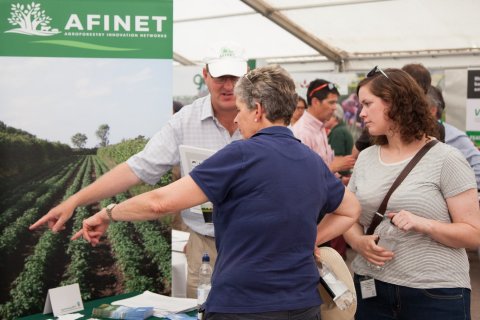We have promoted AFINET at a number of high profile national events in the UK this summer; including Agroforestry 2017 on 22nd June (the first national conference on Agroforestry in the UK), National Organic Combinable Crops 6th July the largest on-farm event for UK organic farmers and the Allerton Trust annual open day on the 28th June at their demonstration farm in Leicestershire. Over 200 people attended each event and the AFINET project was promoted in a variety of ways, with pull up banners and project leaflets and postcards on display on information stands at each event, at the 2 on farm events, the UK AFINET project partners promoted agroforestry and the UK AFINET RAIN as part of the farm tour.
The first AFINET workshop was held as part of a tree fodder day at Elm Farm in May. Key discussions included market opportunities, such as selling tree fodder as a premium product to horse owners, the mechanisation of harvesting, and the potential trade-offs and synergies in managing trees for multiple objectives (i.e. wildlife, fruit, fodder, timber or fuel). Questions raised included: How much tree fodder must a sheep ingest for a meaningful effect on parasites? Which tree species, arrangements and management methods work for different farming systems? What are the nutritional characteristics of different tree species and how does this vary between varieties? And perhaps most importantly, do the potential health benefits translate into an economic advantage?
Upcoming planned events include agroforestry for growers at Tolhurst Organic on the 19th September and a silvopastoral workshop in Scotland in September.
An online stakeholder survey has been widely circulated and promoted, it is designed to enable people to join the network and to help us identify the key factors influencing agroforestry innovation. 102 responses to date of which 96 have indicated that they would like to be part of the UK RAIN. The largest response group was farmers (46) followed by researchers (19) and advisors (12). The most common barriers to the wider adoption of agroforestry identified in the survey so far include the cost of establishment/ management, lack of policy support and few working examples of best practice to learn from. The stakeholder survey will remain open until September after which we will summarise the responses and then in collaboration with the survey participants (initial RAIN members) we will identify common areas of interest to take forward into future RAIN meetings.
To know more about the project and the UK RAIN, follow us here.












